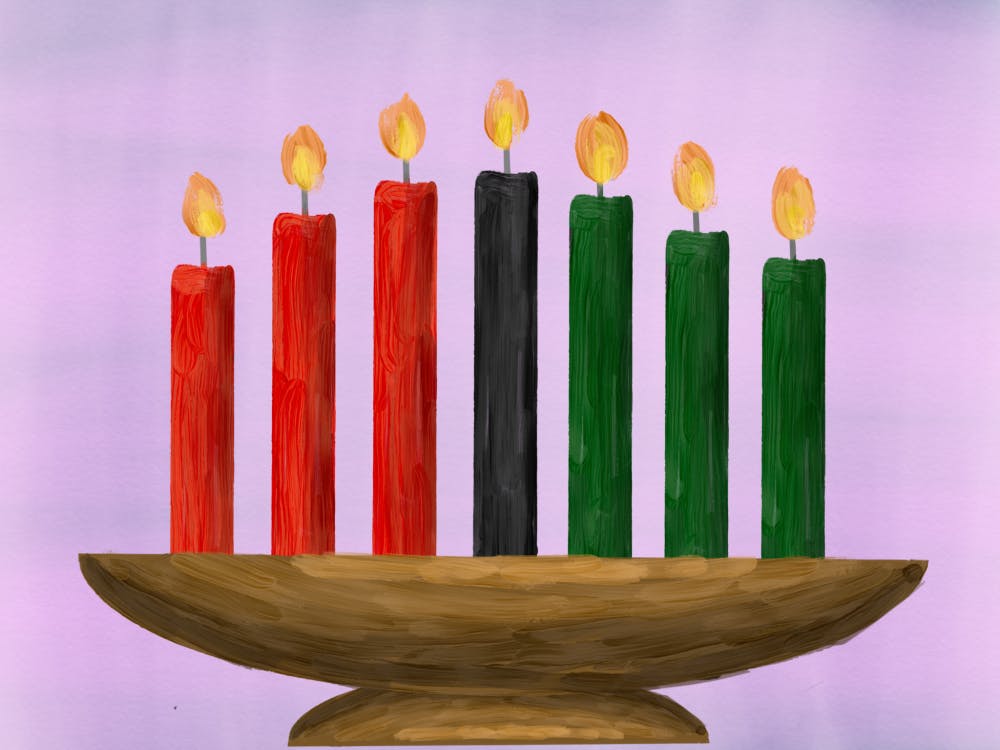This year, Kwanzaa will be celebrated from Wednesday, Dec. 26 to Tuesday, Jan. 1.
Kwanzaa is a holiday that originally began as part of the Black Liberation Movement of the 1960s, restoring the roots African Americans have in African culture. Kwanzaa also brings together and reinforces the bonds of African American culture.
“It’s not a black Christmas, as people try to say, and it’s not a religious holiday, either,” Winsome Chunnu, director of the Multicultural Center at OU, said. “It came around in the 1960s as a response to everything else that was happening in the United States in the 1960s … The seven principles are in Swahili, which is Kenyan in origin, and they are around bringing the black community together.”
The seven principles of Kwanzaa are umoja (unity), kujichagulia (self-determination), Ujima (collective work and responsibility), ujamaa (cooperative economics), nia (purpose), kuumba (creativity) and imani (faith). Each value was decided in order to stress family, community and culture, and are recognized on a different day throughout the week by those who celebrate Kwanzaa.
“We’ve never historically had the opportunity to build generational wealth within the black community, so this is an opportunity for us to connect with each other, not just as a family … but in the black family, and encompassing everyone,” Chunnu said. “So, for example, if you do not have money, your focus shouldn’t be about going out for Christmas and buying a gift. It should be about making a gift that you’re giving to a friend or your family member. It means so much more because you’ve spent time and you’ve thought about it. … If you strengthen the family, then you’ll be able to strengthen the whole community.”
Amel Jones, an undecided freshman, said her family gives each other their favorite foods or will play games with each other to bond during Kwanzaa.
“I just feel like it kind of gives you something different to look forward to, instead of basic Christmas or Thanksgiving,” Jones said. “It’s more of a different holiday to kind of reflect on the past, present, (and) future and kind of go from there.”
The Black Student Cultural Programming Board and the Multicultural Center worked together and planned an event in order to celebrate Kwanzaa in Baker Center on Monday.
“I’m Afro-Latina, and I grew up in a primarily Latin home, and (Kwanzaa) is not a part of the latin culture,” Imani Smith, a senior studying psychology, said. “So, I haven’t (celebrated) but … I definitely do embrace it as an African American and as someone who is immersed in my culture and stuff. Especially, like, being a part of BSCPB, I’ve learned over the years what Kwanzaa is and what it means.”
Smith is also the president of the Black Student Cultural Programming Board, and although she didn’t grow up celebrating Kwanzaa, she feels connected to the holiday because her name, Imani, means faith in Swahili and doubles as one of the seven principles.
“It helps me to appreciate my culture more and to just kind of understand what the culture values,” Smith said. “The culture is kind of trying to take it back to the roots of it all because that’s what Kwanzaa’s about. It’s about celebrating African American culture and where it came from, which is Africa, so we’re really just trying to embrace and remember where we came from. I definitely think it helps me embrace my culture.”
OU’s Kwanzaa program consisted of a feast, a reading of the seven principles, a lighting of candles, a discussion about Kwanzaa itself, and performances from student groups such as Section Eight and Title IX. OU also brought students from the local elementary and middle schools to campus for the K is for Kwanzaa program, where students were taught about the principles and foundations of Kwanzaa.
“We want to expose our black students, as well as the larger community, to Kwanzaa,” Chunnu said. “It’s about bringing the OU family together … to celebrate Kwanzaa because the principles are applicable to anyone. They’re not unique to any particular race. We have our own separate families, but we’re all the Bobcat family.”






